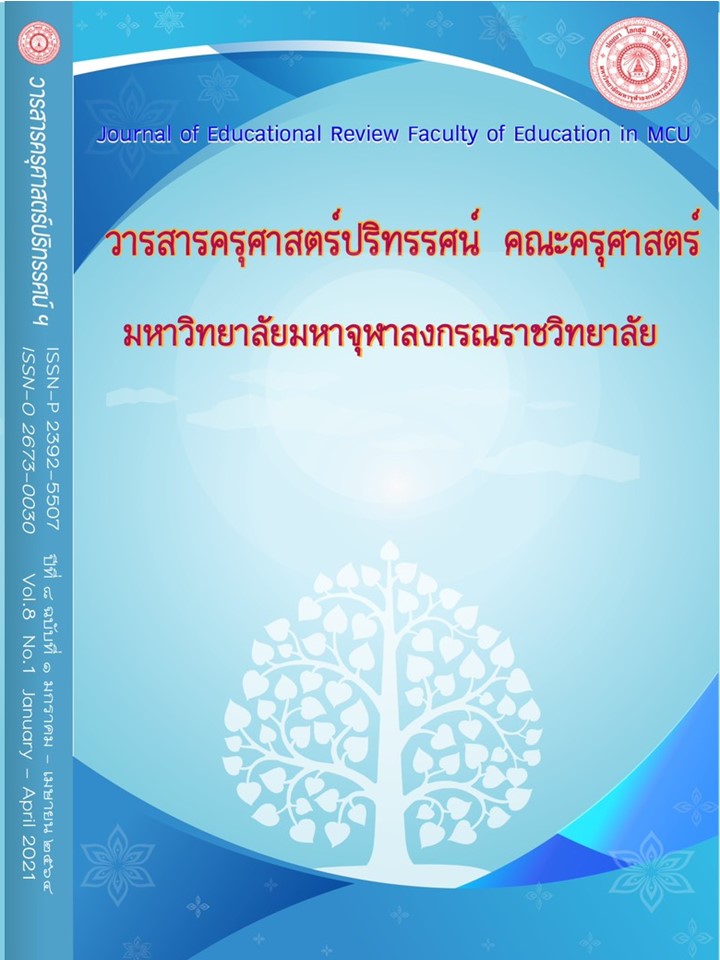HUMAN RESOURCE DEVELOPMENT IN THE AGE OF DIGITAL DISRUPTION
Main Article Content
Abstract
The purpose of this research were 1) to study the guideline to develop human resources in the age of digital disruption, 2) to study problems and obstacles in human resource development in the age of digital disruption. It was a qualitative research that can use in-depth study for the validation from key informants who were selected by purposive sampling from senior and middle management of the public sector, human resource practitioners and university lecturers in human resources department. The total of 19 key informants were knowledge and expertise in the subject matter, and they were used for in-depth interview. The results found that 1) Human resource development guidelines in the age of digital disruption consisted of (1) organizational policy and vision by adapting and driving knowledge and innovation, systematically changing, the management system and developing human resources by developing human resources based on the 4 principles of effectiveness, efficiency, value and flexible adaptability. This also includes adjusting the work methods of personnel to be in line with the age of digital disruption and the New Normal way. (2) Human resource development design by developing the digital skills needed for people, develop creativity and innovation skills, develop and maintain high-potential personnel with the organization. (3) Recruiting and selecting potential personnel by improving the recruitment process and applying modern technology, using online social networks to assist in recruiting. (4) Strategies for retaining and developing high-potential personnel by pushing the compensation side up create a path to grow in the profession, promote and encourage continuous learning opportunities. 2) Problems and obstacles in human resource development in the age of digital disruption were (1) brain drain, (2) morale and career security, (3) people of different generation, (5) personnel lack of skills, (6) the management does not focus on planning the real human resource development, (7) lack of budget for the purchase of facilities, and (8) personnel lacks engagement with the organization.
Article Details
ทัศนะและความคิดเห็นที่ปรากฏในบทความในวารสารฉบับนี้ถือเป็นความรับผิดชอบของผู้เขียนบทความนั้นเพียงผู้เดียว และไม่ถือเป็นทัศนะและความรับผิดชอบของกองบรรณาธิการ
กองบรรณาธิการขอสงวนสิทธิ์ในการคัดเลือกบทความลงตีพิมพ์และจะแจ้งให้เจ้าของบทความทราบหลังจากผู้ประเมินบทความตรวจอ่านบทความแล้ว
ต้นฉบับที่ได้รับการตีพิมพ์ในวารสารครุศาสตร์ปริทรรศน์ คณะครุศาสตร์ มหาวิทยาลัยมหาจุฬาลงกรณราชวิทยาลัย ถือเป็นกรรมสิทธิ์ของคณะครุศาสตร์ มหาวิทยาลัยมหาจุฬาลงกรณราชวิทยาลัย ห้ามนำข้อความทั้งหมดหรือบางส่วนไปพิมพ์ซ้ำ เว้นเสียแต่ว่าจะได้รับอนุญาตจากมหาวิทยาลัยฯ เป็นลายลักษณ์อักษร
References
จินต์จุฑา จันทร์ประสิทธิ์. (2559). การพัฒนาทรัพยากรมนุษย์ของบุคลากรทางการศึกษาสถาบันบัณฑิตพัฒนศิลป์. วิทยานิพนธ์รัฐประศาสนศาสตรมหาบัณฑิต. มหาวิทยาลัยเทคโนโลยีราชมงคลรัตนโกสินทร์.
ชิดชนก ชูนุช. (2562). การพัฒนาบุคลากรในสังกัดสถาบันพัฒนาข้าราชการกรุงเทพมหานคร. วิทยานิพนธ์รัฐประศาสนศาสตรมหาบัณฑิต. มหาวิทยาลัยรามคำแหง.
พรพิมล ศิริวุฒิรังสรรค์. (2562). การพัฒนาบุคลากรภาครัฐของสำนักงานพระพุทธศาสนาจังหวัดสมุทรสาคร: กรณีศึกษาสำนักงานพระพุทธศาสนา จังหวัดสมุทรสาคร. วิทยานิพนธ์รัฐประศาสนศาสตรมหาบัณฑิต. มหาวิทยาลัยรามคำแหง.
พิชญ์สินี มะโน. (2562). ผลกระทบจากการเปลี่ยนแปลงในยุค DIGITAL DISRUPTION ต่อการศึกษา. วารสารครุศาสตร์อุตสาหกรรม. 18(1). 1-6.
ภัทร พจน์พานิช. (2560). การพัฒนาทรัพยากรมนุษย์ภายใต้นโยบายประเทศไทย 4.0. รายงานการวิจัย. วิทยาลัยป้องกันราชอาณาจักร.
วิริยา ลีลาสุธานนท์. (2560). การบริหารและการพัฒนาทรัพยากรมนุษย์ในยุคประเทศไทย 4.0 กรณีศึกษา: สถาบันการเงินประเภทธนาคาร. วิทยานิพนธ์วิทยาศาสตรมหาบัณฑิต. สถาบันบัณฑิตพัฒน บริหารศาสตร์.
สุภางค์ จันทวานิช. (2547). วิธีการวิจัยเชิงคุณภาพ. พิมพ์ครั้งที่ 12. กรุงเทพมหานคร: สำนักพิมพ์แห่งจุฬาลงกรณ์มหาวิทยาลัย.
โสมวลี ชยามฤต. (2564). การพัฒนาทรัพยากรมนุษย์เพื่อรองรับยุคดิจิทัลขององค์การภาครัฐและเอกชน. วารสารสหวิทยาการมนุษยศาสตร์และสังคมศาสตร์. 4(1). 38-50.
อรพรรณ หนูเสน. (2562). การพัฒนาทรัพยากรบุคคลของสํานักการคลัง กรุงเทพมหานคร. วิทยานิพนธ์รัฐประศาสนศาสตรมหาบัณฑิต. มหาวิทยาลัยรามคำแหง.
อารดา ฉิมมากูร และกฤตสุชิน พลเสน. (2561). การพัฒนาประเทศไทย 4.0 ด้วยหลักไตรสิกขา. วารสารปรัชญาปริทรรศน์. 23(2). 57-68.


